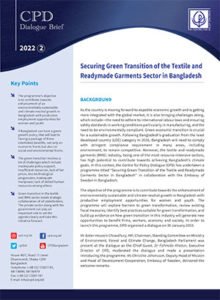 As the country is moving forward to expedite economic growth and is getting more integrated with the global market, it is also bringing challenges along, which include—the need to adhere to international labour laws and ensuring safety standards in working conditions particularly in manufacturing, and the need to be environmentally compliant. Green economic transition is crucial for sustainable growth. Following Bangladesh’s graduation from the least developed country (LDC) category in 2026, Bangladesh will need to comply with stringent compliance requirements in many areas, including environment, to remain competitive. Moreover, the textile and readymade garments (RMG) industry, being one of the most resource-intensive sectors, has high potential to contribute towards achieving Bangladesh’s climate goals. In this context, the Centre for Policy Dialogue (CPD) has undertaken a programme titled “Securing Green Transition of the Textile and Readymade Garments Sector in Bangladesh” in collaboration with the Embassy of Sweden in Bangladesh.
As the country is moving forward to expedite economic growth and is getting more integrated with the global market, it is also bringing challenges along, which include—the need to adhere to international labour laws and ensuring safety standards in working conditions particularly in manufacturing, and the need to be environmentally compliant. Green economic transition is crucial for sustainable growth. Following Bangladesh’s graduation from the least developed country (LDC) category in 2026, Bangladesh will need to comply with stringent compliance requirements in many areas, including environment, to remain competitive. Moreover, the textile and readymade garments (RMG) industry, being one of the most resource-intensive sectors, has high potential to contribute towards achieving Bangladesh’s climate goals. In this context, the Centre for Policy Dialogue (CPD) has undertaken a programme titled “Securing Green Transition of the Textile and Readymade Garments Sector in Bangladesh” in collaboration with the Embassy of Sweden in Bangladesh.
The objective of the programme is to contribute towards the enhancement of environmentally sustainable and climate-neutral growth in Bangladesh with productive employment opportunities for women and youth. The programme will explore barriers to green transformation, review existing fiscal measures, identify best practices suitable for green transformation, and build up evidence on how green transition in this industry will generate new opportunities to benefit firms, workers, economy and society. In order to launch this programme, CPD organised a dialogue on 30 January 2022. This dialogue brief focuses on some highlights from that dialogue.
Publication Period: April 2022
Editor: Fahmida Khatun
Author: Centre for Policy Dialogue (CPD)


